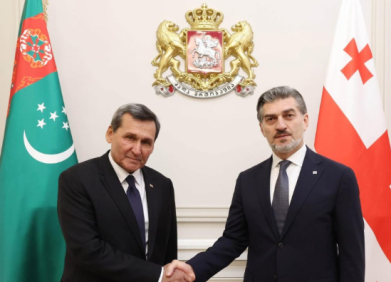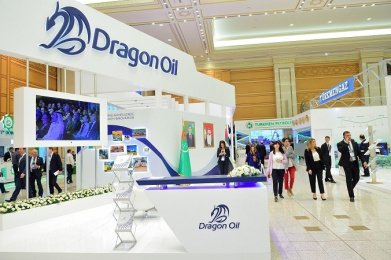Training sessions continue within the framework of the U.S. Department of State's "International Training Program" for representatives of Turkmenistan's education system
19.12.2024 | 13:45 |Training sessions continue within the framework of the U.S. Department of State's "International Visitor Leadership Program" (IVLP) for representatives of Turkmenistan's education system.
As part of the program, members of the Turkmen delegation gave presentations at Kent State University in the U.S. state of Ohio. The event was attended by Kent State University students, faculty, and professors.
The Turkmen speakers provided an in-depth discussion on the comprehensive reforms and achievements taking place in Turkmenistan's education sector, which are being implemented under the leadership of the President of Turkmenistan. They spoke about efforts to improve the national education system, the development of a well-rounded and innovative youth capable of managing modern technologies, and the ongoing work to enhance the quality of education in the country.
The speakers also highlighted the construction of modern educational institutions, alongside social infrastructure, in both urban and rural areas of the country. They discussed the objectives set out in national programs, such as the "Revival of New Epoch of the Powerful State: National Program for the Socio-Economic Development of Turkmenistan in 2022-2052," which aims to develop the education sector at a high level, prepare highly qualified specialists, and align with the principles of universal secondary education, the development of digital education, and the improvement of foreign language instruction and teaching of natural and exact sciences. The presenters explained how Turkmenistan is working to align its education system with global standards, continuously incorporating international best practices into the sector. They also spoke about the ongoing expansion of cooperation with foreign countries' educational and scientific centers, the concrete goals and tasks set to improve the system, and the significant opportunities available to achieve these objectives.
Later, the studies continued at Kent State University’s International Education Department. Present at the event were the university's Vice President for International Education, Mr. Paulo Mussi; Deputy Director of the International Education Department for International Cooperation, Ms. Rachael Mundie; Central Asia Specialist, Ms. Ayya Hudaybergenova; Deputy Director for International Student Admissions, Ms. Elli Styles; and Director of the Study Abroad Department, Ms. Amber Cruxton.
Representatives from the United States emphasized that Kent State University’s International Education Department is focused on global education issues, supports the internationalization of the learning environment, and creates opportunities for international cooperation for students and faculty.
The main areas of the department’s work were outlined as follows:
Implementing programs related to studying abroad in foreign countries;
Running exchange programs for students and faculty;
Developing international cooperation with higher education institutions around the world;
Providing support to Kent State University students;
Preparing the necessary documentation for international students.
Speakers highlighted that the department’s international relations, cultural exchange, and global cooperation significantly contribute to enhancing the university’s academic competitiveness.
Ms. Elli Styles and Ms. Amber Cruxton provided detailed information on exchange programs and other opportunities for Kent State University students, as well as the regulations for foreign students at the university.
It was noted that currently, there are four types of programs in which Kent State University’s students and faculty are involved in studying (or working) abroad:
1) Sending students to partner institutions abroad based on exchange programs;
2) Sending students to study at Kent State University’s Florence campus (Italy);
3) Organizing 1-3-week educational programs for students wishing to study abroad, in collaboration with partner institutions;
4) Joint scientific research conducted by Kent State University’s faculty with faculty members of partner universities.
Additionally, a hybrid program with Brazil was mentioned, where students spend two years at Kent State University and two years at a Brazilian university, receiving dual degrees from both countries upon completion.
It was noted that annually, 1,500 students are sent abroad for educational purposes.
In order to explore the work of the Polymer Industry Cluster, which maintains active communication with higher education institutions in the United States, a meeting was held with Ms. Holly Harris Bane, Director of Economic Development for Aurora City, President of Akron's Global Communications Council, Mr. Gregg Gramer, Vice President of Economic Development at the Greater Akron Chamber, Mr. Sam Deshazior, Economic Development Advisor and Consul for Akron's Executive Administration, and Ms. Alyssa Carpenter, Director of Business Development at the Greater Akron Chamber.
During the meeting, speakers introduced Akron as an important industrial center in the United States and familiarized the participants with its history.
The Polymer Industry Cluster brings together over 70 companies and research institutions involved in the production and marketing of polymers and related technologies. Due to its strategic location, advanced infrastructure, and skilled workforce, the cluster is one of the key centers for companies in the polymer industry.
Additionally, regional higher education institutions and research centers play a crucial role in supporting the cluster.
The cluster's key activities include:
Producing polymers (polyethylene, polypropylene, polystyrene) and chemical materials, as well as additives and copolymers to improve material properties;
Manufacturing plastic products for various industries such as automotive, packaging, construction, medical, and consumer electronics;
Conducting research on new polymer materials and sustainable technologies;
Designing engineering processes and developing new production techniques and equipment for the polymer industry, providing consultation and technical support to businesses in polymer recycling and usage;
Conducting laboratory tests, ensuring compliance with standards, and assessing the physical, chemical, and mechanical properties of new polymers and plastics;
Collaborating with higher education institutions to train experts in polymer technologies and chemistry, preparing industry professionals, and offering opportunities for advanced training.
The cluster collaborates with Akron’s educational institutions, especially Akron University, in the following areas:
Training highly qualified specialists based on industry needs;
Partnering with universities in research on new polymer materials, recycling, and sustainable innovations, carrying out joint projects and funding them;
Organizing internships and professional training for students at production facilities of cluster member companies;
Participating in competitions for government and private grants for research in polymer technologies;
Assisting in the implementation of new technologies developed by higher education institutions into production;
Conducting joint scientific conferences.
ORIENT news











